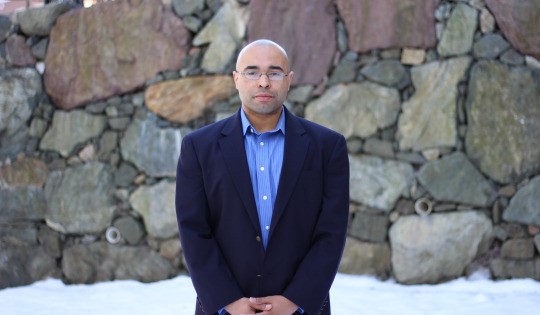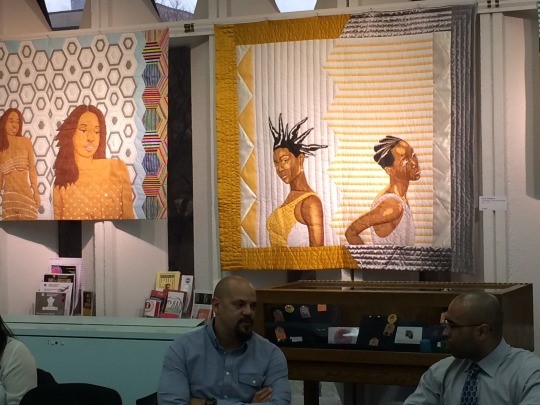Guest Spotlight: Christopher Cameron
Prof. Christopher Cameron was a guest panelist at the 2017 Grace Holt Celebration panel entitled "The Future of African American Studies." In his interview, he speaks about teaching and the importance of Black Studies.
Part One of Interview with Christopher Cameron

So what is your current role?
I’m an Associate Professor of History at UNC Charlotte. I teach courses on colonial and revolutionary America, slavery, and abolitionism. I’m also the director of the history honors program, so I sort of oversee all of the honors students we have and help them with their scholarly goals.
Do you consider yourself from the south?
No, I’m from New Hampshire. I went to college up there. I attended graduate school at UNC Chapel Hill and then got my job at UNC Charlotte in 2010, so I’ve been in the south for about 10 years.
Were you attracted to the Charlotte area specifically?
I liked North Carolina from my time at Chapel Hill but you also go where the jobs are. I wanted to be in a city.
Do you find a lot of topics within Black Studies in your history department?
One course I teach is African American history to 1865 and this is a course that is cross listed with Africana Studies. Probably about half the students from that course are Africana studies majors. Whenever possible I do try to teach courses that are related to Black Studies. Even when I’m teaching a course not about Africana Studies half of it still is. For instance, I’m teaching a course for liberal arts and sciences on free thought in America. We have eight readings during the semester and four of them are by black atheists and agnostics. So even though African American atheists and agnostics are underrepresented with the free thought community I still try to highlight them in my courses.
Part Two of Interview

I’m not sure if I could name even one person.
You may not think of them as free thinkers but you do know them: Zora Neale Hurston, Langston Hughes, W.E.B. Dubois, and Frederick Douglass.
What are some interesting topics within your honors classes that you enjoyed giving feedback?
I had a student who was working on the role of Presbyterians in the American Revolution. A really great study highlighting the role that both ministers played in the theology of Presbyterianism played during the revolution in north Carolina. Probably the most interesting topic involves a student I have right now who is working on the theology of property in American history. This is a thesis that rose out of the recent protest in Charlotte after the killing of Keith Lamont Scott by the police. He was involved in the protest as an activist and one of the things that he noticed is that police and national guardsmen were often taking defensive postures around banks and corporate buildings. He saw the rhetoric around the protests from the media often revolved around whether or not there was any property destroyed. He was looking at this idea of property almost as a religion.
So someone reached out to you to involve you in this event [Grace Holt Panel on March 6], but what attracted you to “The Future of African American Studies” as a topic?
I do teach a lot of Africana studies students and I’m interested in their future. Our history department shares a floor with Africana Studies, so even though I’m not a faculty member I’m involved, I get the emails, and we collaborate in bringing speakers in so I consider myself an Africana Studies scholar even though I’m not in the department.
Everything really should be more interdisciplinary.
Definitely, yeah.
When it comes to history, do you get any criticism about studies focusing too much on the past and not enough present?
Not really, no. I think mostly because among us historians that would be pretty blasphemous. But I think historians recognize that what’s going on now cannot be understood without reference to past events. Our identity, our political development, culture, religion. We need to understand the past in order to know what’s going on today. So no I don’t think so though I do think historians do tend to be over-represented in Africana Studies departments in exclusion of economists, scientists. We might need a little bit more diversity.
So how would you describe the future of African American Studies?
I think it’s a challenging future but one filled with a lot of opportunities. This political moment is very mobilized. A lot of people have shown us the real importance of the work we do in African American Studies, but at the same time this moment presents a lot of challenges in terms of funding and staffing.
So you were at the luncheon today where Dr. Greg Gaither talked about how the most important thing is just having a baseline curiosity for Black Studies. For people going into these studies, what do you think are the integral things needed to have an understanding of this subject matter?
I was glad he said that because I tell my students all the time that you’re not in college to get a job. Plenty of college graduates can’t find work. So if you’re here to find a job you might be wasting your money. You’re here to make yourself a better person, to educate yourself, to learn about your community, yourself, to figure out the type of person you are, the type of person you want to become. So I think that’s the central goal of any discipline. At the same time, you can’t ignore people’s practical goals so we do need to tailor our curricula and course offering and events so that people will be prepared to enter the job market. But I would say don’t make that your primary goal.
Do you think that it should be required that everyone take a Black Studies course in college?
I wouldn’t necessarily say we have to require Africana studies but I would say in an institution that has Asian, African American, Africana, Latin American, etc., it would make sense to take something. It sort of depends on the institution and the amount of offerings. It may not be practical to require these courses. You might have a department that has only three or four full-time faculty members so they wouldn’t be able to handle all these people required to take an Africana Studies class.
Do you have any research you’re working through?
I’m working on a history of African American free thinkers from 1800s to 1975. I look at the rise of black atheism during the era of slavery and then its growth during the Harlem Renaissance and the radical politics of the 1920s and 1930s. Also the role of black atheists and agnostics in the civil rights movement.
That’s so interesting because a lot of people, including scholars, seem to say Black Studies is connotative with religion. I could see freethinking being overlooked.
Yeah. This would actually be the first history of black freethought.
Anything else you would like to call attention to?
If you haven’t done so please check out the website for the African American Intellectual History Society. It’s a great resource for scholars in Africana Studies. Subscribe to our daily blog posts. Next year, apply for our fellowships.